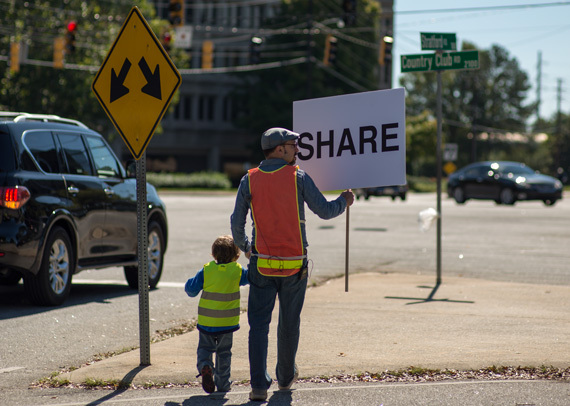
Joel Tauber, "SHARE" (photo direction: Joel Tauber, shot by Kristi Chan) from the art installation and movie, "The Sharing Project"
I was talking with the anthropologist David Graeber about how communism forms the baseline of all human interactions, even in the most capitalistic societies. Communism is a loaded term, but it really should be understood as a kind of transactional morality, where we act according to Louis Blanc's principle, from each according to his abilities, to each according to his needs. When we don't keep track of who is giving what to whom, we are acting in a communistic way.
Sharing, in its purest form, is communistic. It occurs when no one claims exclusive ownership. It happens when people share what they believe belongs to everyone, or to their particular community.
When my son Zeke and his friends play harmoniously with the communal toys at school, they are sharing in a communistic way. When Zeke and his brother Ozzie take turns playing with our family's communal toys at home, they are also practicing this kind of sharing.
In Greenland, an Inuit once explained to the anthropologist Peter Freuchen why he would be willing to share several hundred pounds of meat with a hunter that hadn't been as successful: "Up in our country we are human! ... And since we are human we help each other. We don't like to hear anybody say thanks for that. What I get today you may get tomorrow. Up here we say that by gifts, one makes slaves, and by whips, one makes dogs."
Since the Inuit hunter believed that everyone has the right to eat, it made no sense for him to claim exclusive ownership of the meat. If the meat is not considered private property, the idea of gifting the meat is nonsensical. Once private ownership is dismissed, it's only possible to share it in a communistic way.
However, private ownership is not always dismissed.
E.E. Evans-Pritchard and Graeber describe how the Nuer in South Sudan share food and other necessities freely with members of their camp, but they never share their cattle with each other. Indeed, they will literally defend their cattle with their lives.
I was thinking about the Nuer when Zeke invited his friend, Zev, over for a play-date. At the time, Zeke's prized possession was his guitar. Zev wanted to play with it, and Zeke, quite reasonably, refused. I asked Zeke to share his guitar, even though I had made it clear to both Zeke and Zev that I was not willing to share the camera that I was using to film them. Indeed, I would not even let them touch the camera, fearing that they might damage it. Zeke, probably sensing my inconsistency, clung to his guitar as if his life depended on it. Zev grabbed it too, and they spun around the room. Eventually, Zeke relented. Zeke and Zev took turns playing the guitar, and they both seemed happy. It was beautiful, but I was left feeling like a hypocrite. Why should Zeke share his most special possession when I was not willing to do the same thing?
In the United States, we keep much of our property to ourselves, but we do share certain things in communistic ways. We share office supplies with our co-workers, and we share pretty much everything while camping. We share directions freely with strangers; and we post all kinds of information online for everyone's benefit, despite new restrictions from Facebook and other corporate entities.
Everyone has the right to enjoy our parks, libraries, and public schools; and, at least for the most part, our air, oceans, lakes, and rivers belong to all of us. There have been attempts to privatize our parks and water, and funding for our schools and libraries are often threatened; yet they still remain part of the public domain. We share their pleasures as well as the responsibilities of maintaining them.
Of course, some of us share a lot more than others. There may not be as many socialist communes in the United States as there were in other periods, like the 19th century; but they certainly still exist, and people continue to live in them.
I understand the appeal of the socialist commune, and I've fantasized about living in one at different times of my life. When I was 18, I spent the summer on a kibbutz in Israel. I didn't want to leave. I was drawn to the beauty of living a life where we shared everything in communistic ways, but I must have been even more enticed by the American Dream. After a summer of picking carrots and working in a salami factory, I moved back to the States to pursue my personal ambitions.
The ideal of communistic sharing continues to inspire me, and it seems to entice many others as well. People are excited by new online sites like rideshare.com, couchsurfing.com, and mealshare.org; and many are sharing in ways that they wouldn't have imagined previously.
I don't know if I would have been happier if I had stayed on the kibbutz, but I almost certainly would understand more about sharing if I did. One of my brothers has been living on a kibbutz for many years, and we are planning to visit him soon. I'm eager to find out what we will learn about sharing in the process.
Joel Tauber is an artist and filmmaker who teaches experimental film and orchestrates the video art program at Wake Forest University. His current undertaking - "The Sharing Project" - will be presented as both a sculptural video installation (Adamski Gallery For Contemporary Art, Berlin, April 2 - 29; The University Art Museum at Cal State Long Beach, June 12 - July 12) and a feature film. http://thesharingproject.net.